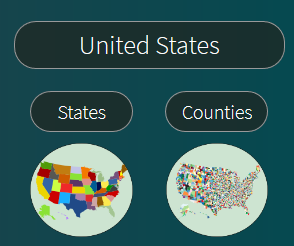Skip to main content
TA Tuesday (August 14, 2018)
Tools and Resources

- Why It's Important to Post Frequently on Social Media by Jayne Corso offers several important reasons for posting frequently: Keeping followers engaged and informed and perhaps the most important reason, staying relevant.
- How to create content that works well with screen readers (GOV.UK) considers a number of issues facing users of screen readers in the UK and the US. The authors also discuss how making website content easier to read by screen readers may make reading and comprehending by low-literacy individuals more difficult.
- MapChart.net lets you make custom maps of the United States and countries around the world. If you need finer detail than countries, the tool lets you map counties in the US (image, right), provinces and territories in Canada, and counties in the UK and Ireland, for example. Maps can be downloaded as a .png and embedded on your website for free.
- Slidely is a "social video creation platform." Users can add video and images and select Slidely-provided music to create videos. Free.
At work
Learn something

- This surprising, everyday tool might hold the key to changing human behavior is an interesting, informative, and useful read. As the author writes, "As Jenny Anderson writes in Quartz: 'There is ample evidence that we can modify parents behavior through technological nudges.'"
You might of heard of "nudges." The idea was developed by behavioral economist Richard Thaler and explored by Thaler and Cass Sunstein in Nudge: Improving Decisions About Health, Wealth, and Happiness. According to Wikipedia,Nudge discusses how public and private organizations can help people make better choices in their daily lives. "People often make poor choices—and look back at them with bafflement!" Thaler and Sunstein write. "We do this because as human beings, we all are susceptible to a wide array of routine biases that can lead to an equally wide array of embarrassing blunders in education, personal finance, health care, mortgages and credit cards, happiness, and even the planet itself."
Put another way, "To count as a mere nudge, the intervention must be easy and cheap to avoid. Nudges are not mandates. Putting the fruit at eye level counts as a nudge. Banning junk food does not." (behavioraleconomics.com)
Nudge units in and outside government have been the rage for several years. The British government's Behavioral Insights Team had such success that they spun off into their own NGO. (Read more about the BIT.) The University of Pennsylvania also has a nudge unit. "The Penn Medicine Nudge Unit is the world’s first behavioral design team embedded within a health system. Our mission is to leverage insights from behavioral economics and psychology to design and test approaches to steer medical decision-making toward higher value and improved patient outcomes."
Good reads




